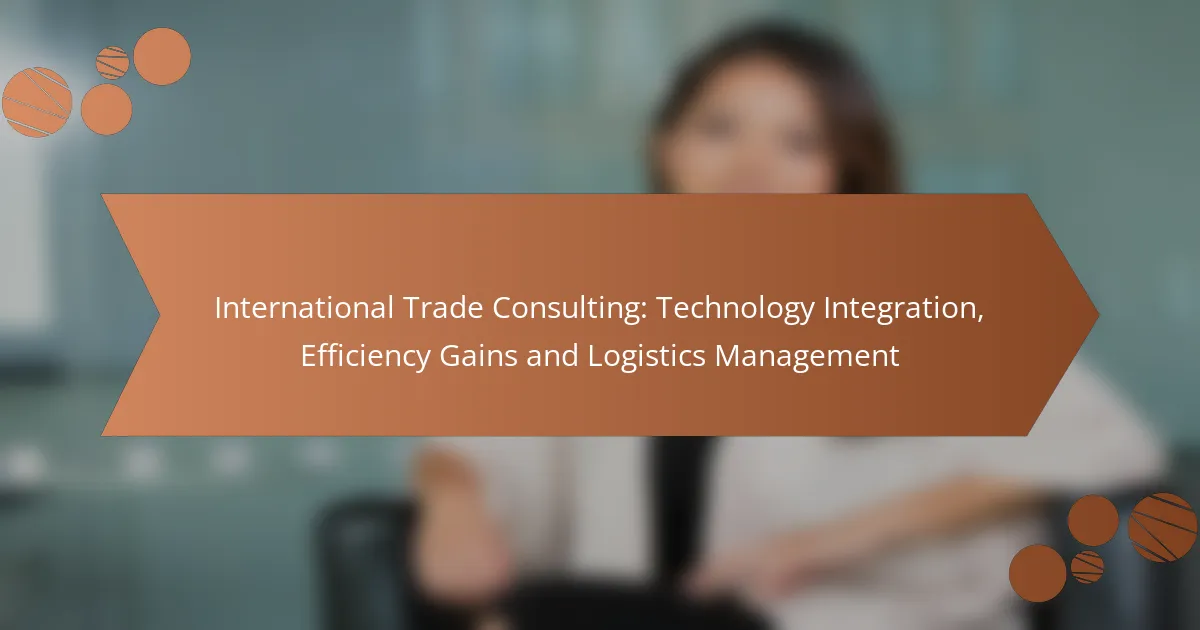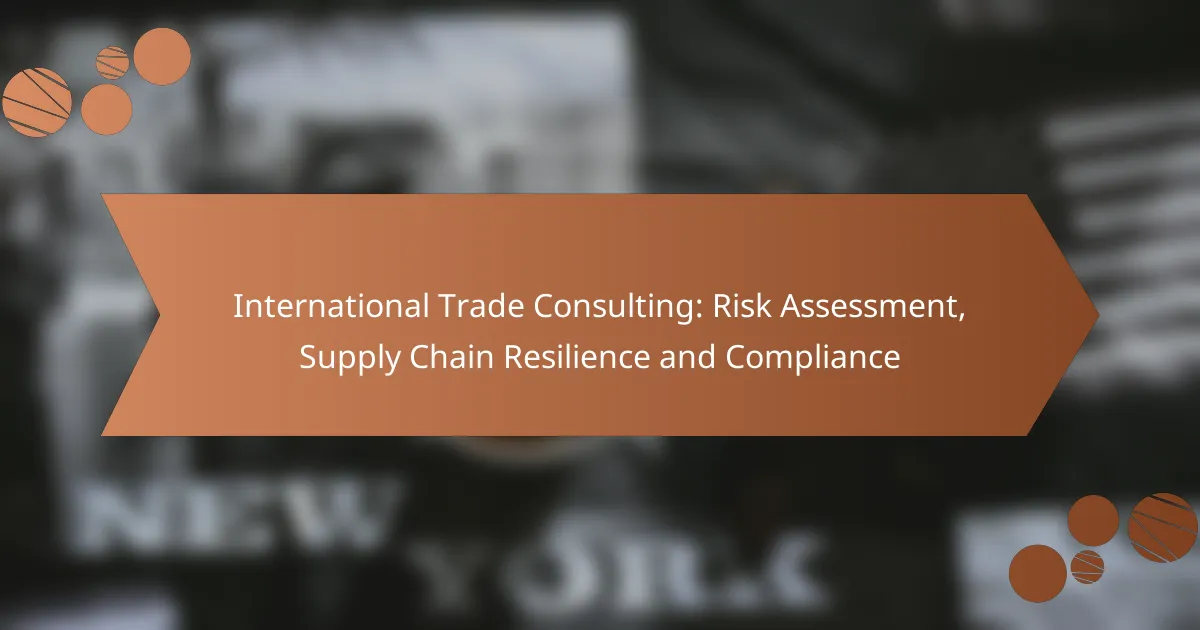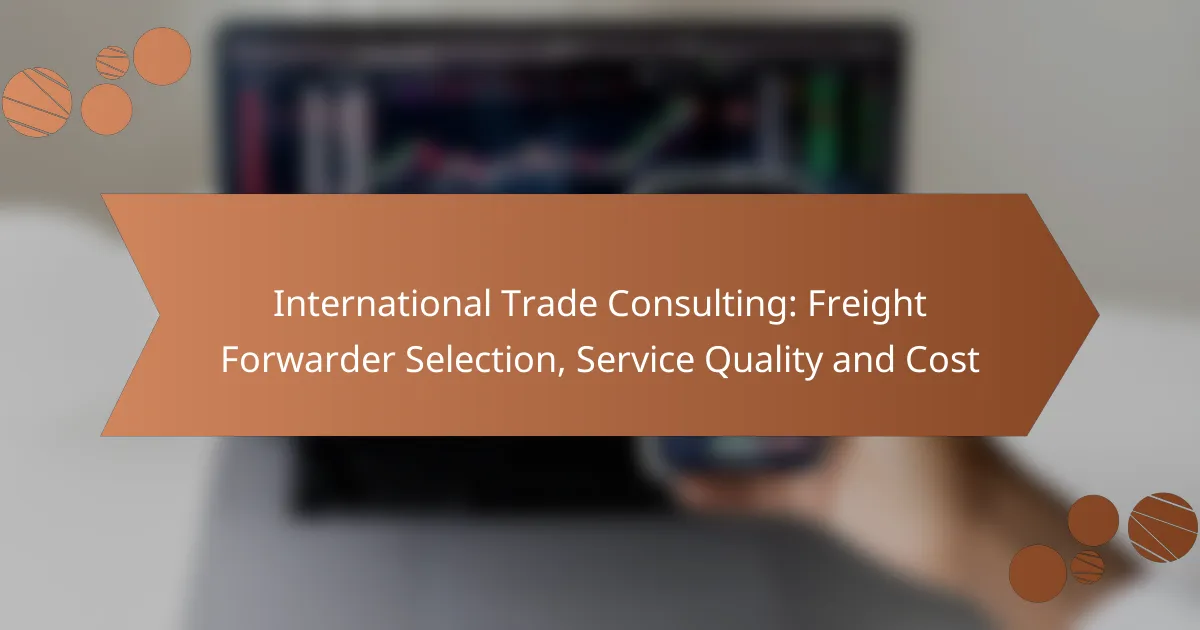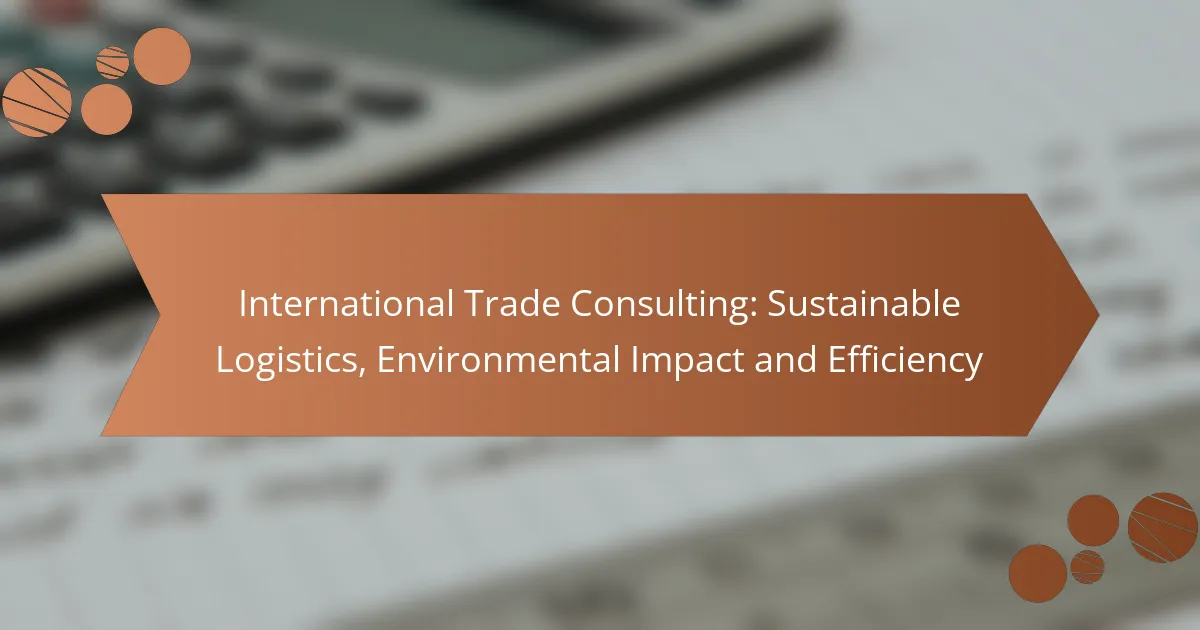International trade consulting is revolutionized through technology integration, which streamlines processes and enhances decision-making with real-time data. By optimizing logistics and leveraging expert insights, businesses can achieve significant efficiency gains, reduce costs, and improve communication. Effective logistics management is essential for ensuring timely and cost-effective transportation of goods, ultimately leading to increased customer satisfaction and a competitive advantage in global markets.
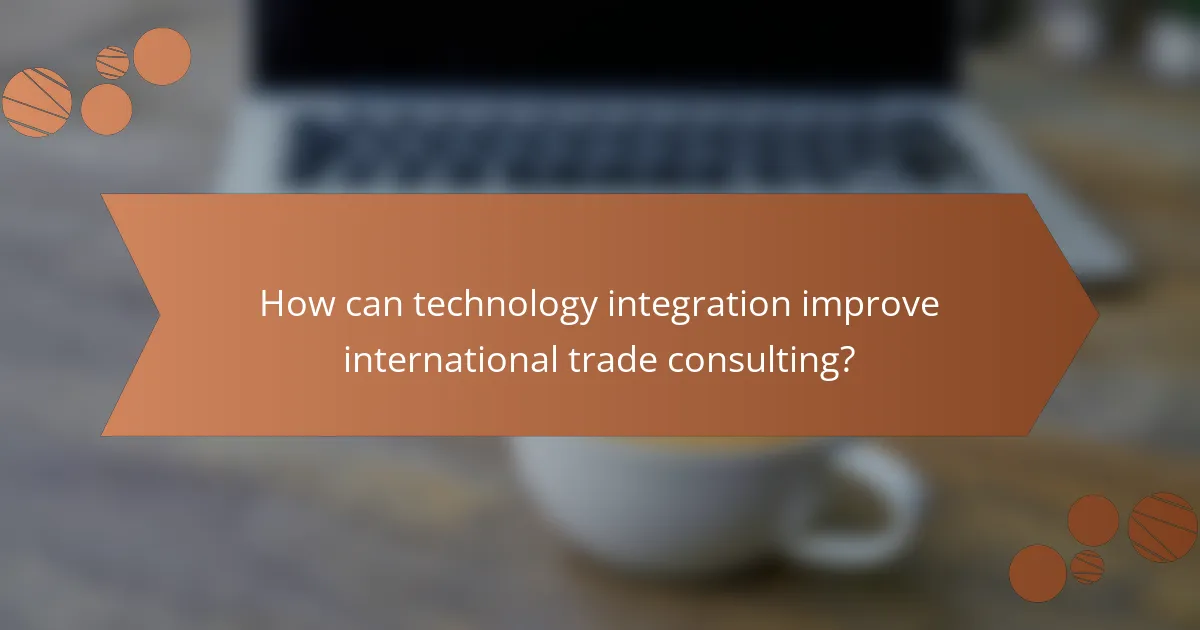
How can technology integration improve international trade consulting?
Technology integration enhances international trade consulting by streamlining processes, increasing efficiency, and providing real-time data for better decision-making. By leveraging advanced tools and systems, businesses can optimize logistics, gain market insights, and ensure transparency throughout the supply chain.
Automation tools for logistics
Automation tools significantly reduce manual tasks in logistics, allowing for faster and more accurate operations. For instance, automated inventory management systems can track stock levels in real-time, minimizing the risk of overstocking or stockouts.
Implementing automated scheduling and routing software can lead to improved delivery times and reduced transportation costs. Companies should assess their current logistics workflows to identify areas where automation can yield the highest efficiency gains.
Data analytics for market insights
Data analytics enables businesses to extract actionable insights from vast amounts of market data, helping them make informed decisions. By analyzing trends, customer preferences, and competitor strategies, companies can tailor their offerings to meet market demands more effectively.
Utilizing tools like predictive analytics can forecast future market conditions, allowing businesses to adapt their strategies proactively. Regularly reviewing analytics reports can help identify emerging opportunities and potential risks in international markets.
Blockchain for supply chain transparency
Blockchain technology enhances supply chain transparency by providing a secure and immutable record of transactions. This allows all parties involved in international trade to verify the authenticity and origin of goods, reducing the risk of fraud.
Implementing blockchain can also streamline documentation processes, as smart contracts automatically execute transactions when predefined conditions are met. Companies should consider the regulatory landscape and potential integration challenges when adopting blockchain solutions in their supply chains.

What efficiency gains can be achieved through consulting?
Consulting can lead to significant efficiency gains by optimizing processes, reducing costs, and enhancing communication within international trade operations. By leveraging expert insights and technology, businesses can streamline their logistics and improve overall performance.
Cost reduction strategies
Implementing cost reduction strategies is essential for enhancing efficiency in international trade. These strategies may include renegotiating supplier contracts, consolidating shipments, and utilizing technology to automate repetitive tasks. For instance, companies can save up to 30% on logistics costs by optimizing their shipping routes and reducing empty miles.
Another effective approach is to analyze and minimize overhead expenses. Regularly reviewing operational expenditures can identify areas where costs can be trimmed without sacrificing quality. Consider using software tools that provide real-time data analytics to pinpoint inefficiencies.
Streamlined operations
Streamlined operations focus on simplifying processes to enhance productivity. This can be achieved by adopting integrated logistics management systems that connect various functions, such as inventory management, order processing, and shipping. For example, utilizing a centralized platform can reduce order fulfillment times from several days to just a few hours.
Additionally, businesses should evaluate their supply chain for bottlenecks and redundancies. Implementing lean management principles can help eliminate waste and improve workflow, ultimately leading to faster turnaround times and increased customer satisfaction.
Improved communication channels
Establishing improved communication channels is vital for fostering collaboration among stakeholders in international trade. Utilizing digital communication tools, such as project management software and instant messaging platforms, can facilitate real-time updates and decision-making. This ensures that all parties are aligned and can respond quickly to changes in demand or logistics challenges.
Moreover, regular training sessions for staff on effective communication practices can enhance teamwork and reduce misunderstandings. Consider setting up a feedback loop where employees can share insights on communication barriers, allowing for continuous improvement in this area.

How does logistics management impact trade success?
Logistics management plays a crucial role in trade success by ensuring that goods are transported efficiently and cost-effectively. Effective logistics can lead to reduced costs, improved delivery times, and enhanced customer satisfaction, all of which are vital for maintaining a competitive edge in international markets.
Optimized shipping routes
Optimized shipping routes are essential for minimizing transportation costs and delivery times. By analyzing factors such as distance, traffic patterns, and weather conditions, businesses can select the most efficient paths for their shipments. Utilizing technology like GPS tracking and route optimization software can significantly enhance these processes.
For example, companies can save up to 20% on fuel costs by choosing the most efficient routes. Regularly reviewing and adjusting shipping routes based on current data can further improve efficiency and responsiveness to market demands.
Inventory management solutions
Effective inventory management solutions are vital for maintaining the right stock levels and ensuring timely fulfillment of orders. Techniques such as just-in-time (JIT) inventory can help reduce holding costs while meeting customer demand. Implementing inventory management software can provide real-time visibility into stock levels and streamline the ordering process.
Businesses should consider using automated systems that integrate with their logistics operations to enhance accuracy and reduce human error. Regular audits and inventory assessments can help identify slow-moving items and optimize stock turnover rates.
Partnerships with freight forwarders
Establishing strong partnerships with freight forwarders can greatly enhance logistics management by providing access to expert knowledge and resources. Freight forwarders can help navigate complex regulations, customs procedures, and shipping options, ensuring compliance and efficiency in international trade.
When selecting a freight forwarder, businesses should evaluate their experience, service offerings, and pricing structures. Building a collaborative relationship can lead to better negotiation terms and improved service levels, ultimately contributing to trade success.

What are the key criteria for selecting a trade consultant?
When selecting a trade consultant, consider their industry experience, technology expertise, and client testimonials. These criteria help ensure that the consultant can effectively address your unique trade challenges and enhance your operational efficiency.
Industry experience
Industry experience is crucial when choosing a trade consultant, as it indicates their familiarity with market dynamics and regulatory environments. Look for consultants who have worked in your specific sector, as they will understand the nuances that affect your business.
Evaluate their track record by asking about previous projects and outcomes. A consultant with a history of successful engagements in your industry can provide insights that lead to better decision-making and strategic advantages.
Technology expertise
Technology expertise is essential for modern trade consulting, especially as businesses increasingly rely on digital tools for logistics and operations. A consultant should be well-versed in relevant technologies, such as supply chain management software and data analytics platforms.
Consider their ability to integrate new technologies into existing systems. A consultant who can recommend and implement solutions that enhance efficiency and streamline processes will be invaluable in today’s competitive landscape.
Client testimonials
Client testimonials offer insight into a consultant’s effectiveness and reliability. Positive feedback from previous clients can indicate a consultant’s ability to deliver results and maintain strong relationships.
Request references and case studies to assess their impact on past clients. Look for testimonials that highlight specific achievements, such as cost savings or improved logistics performance, to gauge how their services might benefit your organization.
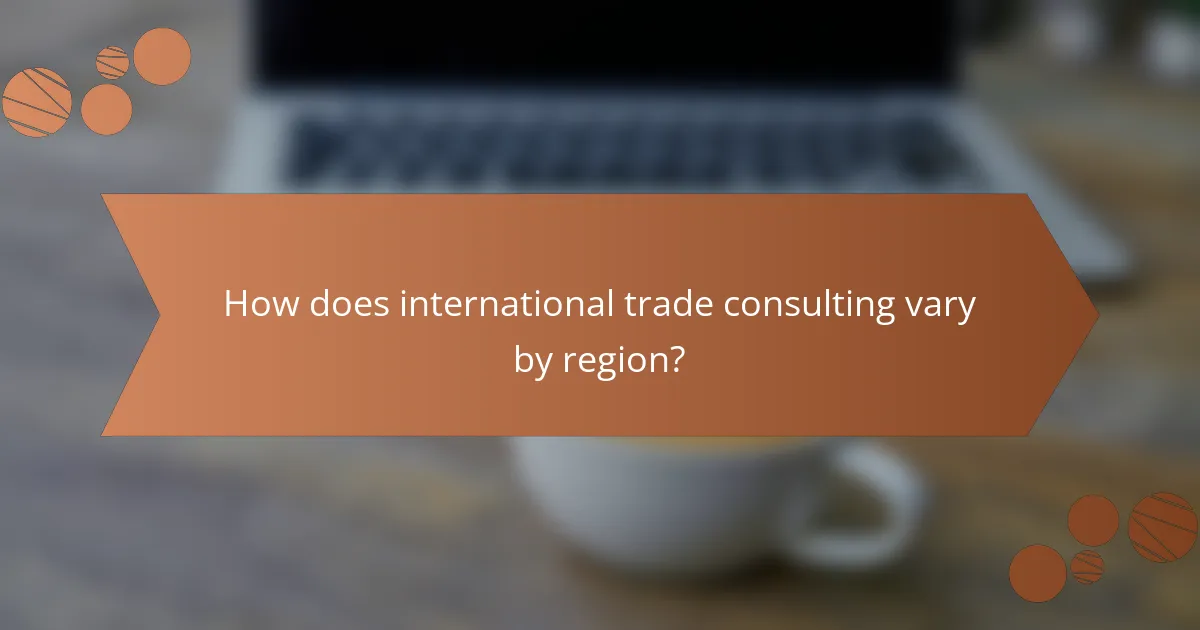
How does international trade consulting vary by region?
International trade consulting varies significantly by region due to differences in regulations, market dynamics, and logistical challenges. Each area presents unique opportunities and obstacles that consultants must navigate to optimize trade efficiency and compliance.
Consulting practices in North America
In North America, consulting practices often focus on streamlining supply chains and enhancing technology integration. Consultants help businesses adopt digital tools like ERP systems and data analytics to improve decision-making and operational efficiency.
Additionally, the emphasis on compliance with trade agreements such as USMCA requires consultants to stay updated on regulatory changes. Companies often seek guidance on tariff classifications and customs procedures to minimize costs and avoid penalties.
Trade regulations in the European Union
The European Union (EU) has stringent trade regulations that require consultants to have a deep understanding of customs laws and compliance standards. The EU’s Common Customs Tariff and various trade agreements necessitate careful navigation to ensure adherence and avoid delays.
Consultants often assist businesses in understanding VAT implications and the intricacies of the Single Market. They provide insights on how to leverage trade agreements to gain competitive advantages while ensuring compliance with local laws.
Logistics challenges in Asia-Pacific
The Asia-Pacific region presents unique logistics challenges, including diverse regulatory environments and varying infrastructure quality. Consultants must address issues like port congestion, customs delays, and differing transportation standards across countries.
Effective logistics management in this region often involves optimizing routes and selecting reliable local partners. Businesses are encouraged to invest in technology for real-time tracking and inventory management to enhance efficiency and reduce costs.
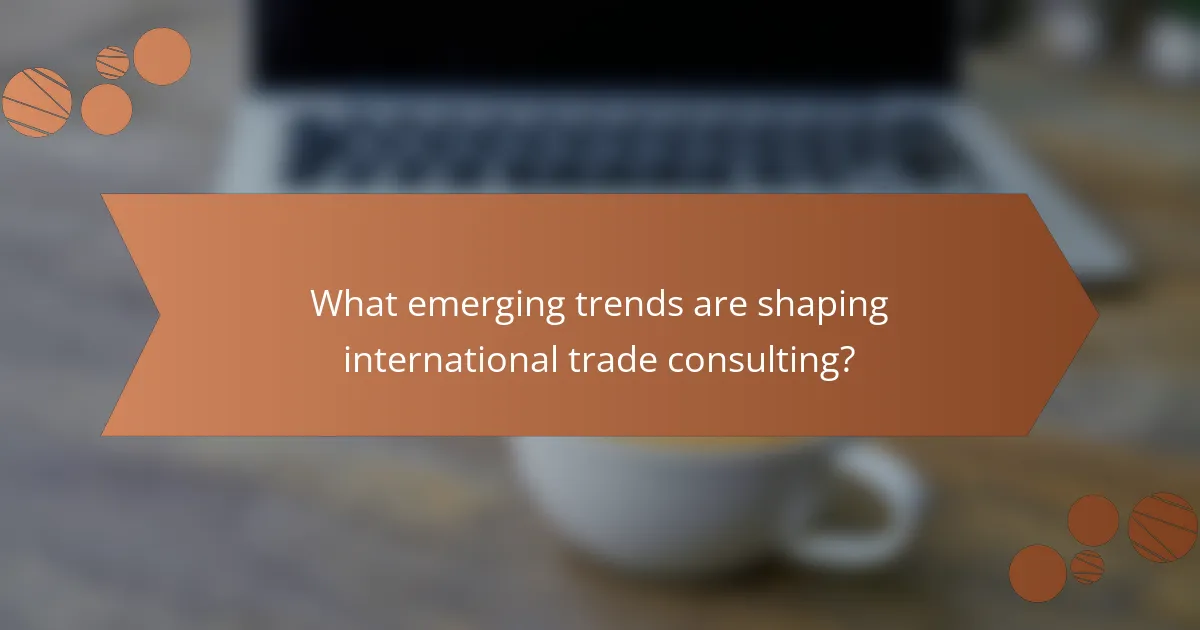
What emerging trends are shaping international trade consulting?
Emerging trends in international trade consulting are increasingly focused on technology integration, sustainability, and logistics management. These trends aim to enhance efficiency and adaptability in a rapidly changing global market.
Sustainability practices
Sustainability practices in international trade consulting are becoming essential as companies strive to meet environmental standards and consumer expectations. These practices often include reducing carbon footprints, optimizing resource use, and ensuring ethical sourcing throughout the supply chain.
To implement sustainability effectively, businesses should assess their current operations and identify areas for improvement. For example, adopting energy-efficient transportation methods or utilizing biodegradable packaging can significantly enhance a company’s sustainability profile.
Consultants can guide organizations in aligning their strategies with global sustainability initiatives, such as the United Nations Sustainable Development Goals (SDGs). By doing so, companies not only comply with regulations but also improve their market competitiveness and brand reputation.
